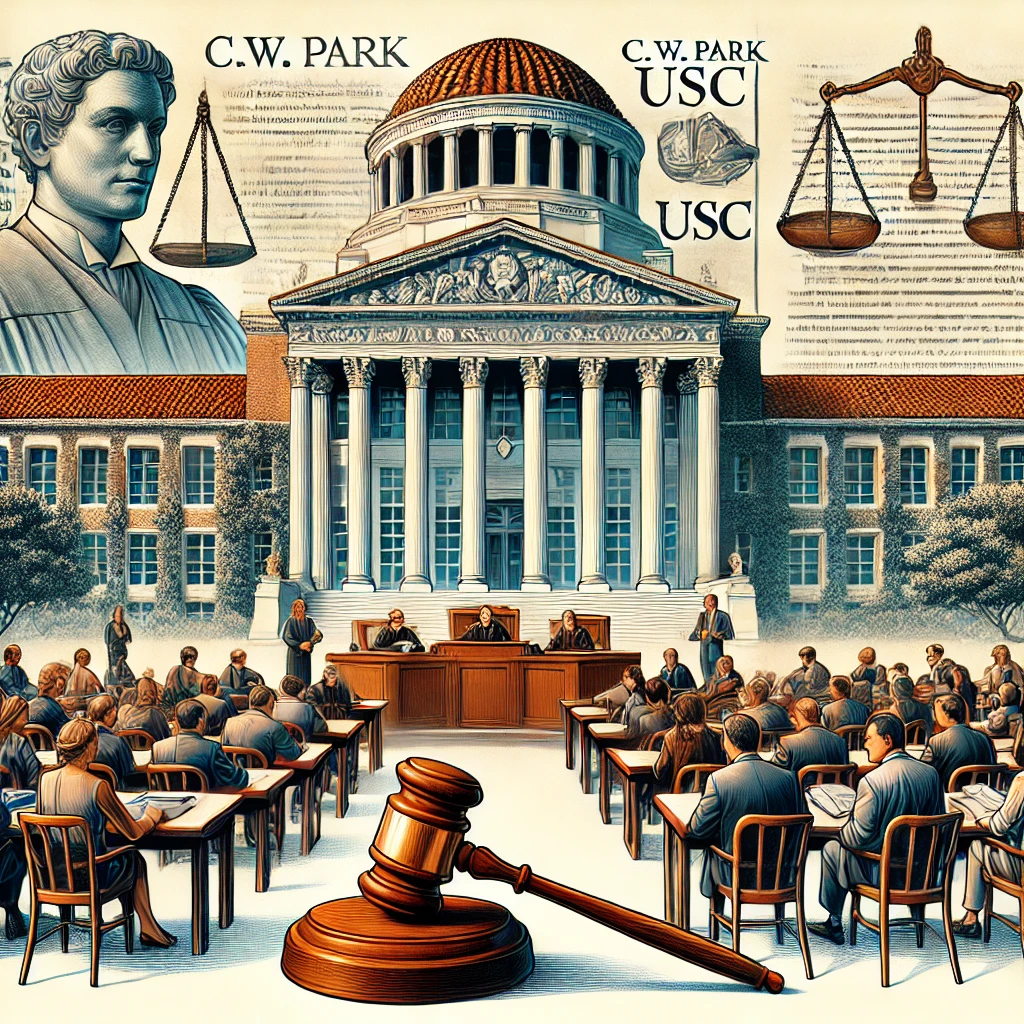The C.W. Park USC lawsuit has sparked significant attention in academic and legal circles. This case involves Chul Woo Park, a former professor at the University of Southern California (USC), who alleges wrongful termination and breach of contract. As the lawsuit unfolds, it raises important questions about tenure, academic freedom, and the policies governing faculty employment at universities. This article provides a detailed analysis of the lawsuit, examining the timeline of events, the legal arguments presented, and the broader implications for academic institutions.
Introduction to the C.W. Park USC Lawsuit
The C.W. Park USC lawsuit centers on claims by Chul Woo Park, a tenured professor at USC’s Department of Electrical Engineering. Park alleges that the university unlawfully terminated his employment, violating his rights as a tenured professor. USC, on the other hand, insists that it followed proper procedures in Park’s dismissal. This legal battle brings forth critical issues related to academic freedom and the integrity of tenure systems within higher education institutions.
Timeline of Events
Understanding the timeline of events is essential for comprehending the C.W. Park USC lawsuit:
Initial Employment:
Chul Woo Park joined USC as a tenured professor, making significant contributions to the field of electrical engineering. Over the years, he built a reputation for excellence in research and teaching.
Filing the Lawsuit:
In [Year], Park filed his lawsuit in the Los Angeles Superior Court, claiming wrongful termination and breach of contract. He argued that USC did not follow the procedures outlined in his employment agreement and the university’s own tenure policies.
USC’s Response:
Following the lawsuit, USC’s legal team denied the allegations, stating that Park’s termination adhered to the university’s established policies. They emphasized that the process was fair and transparent.
Ongoing Proceedings:
The case has since moved through various stages of pre-trial motions and discovery. Both parties are preparing evidence for a potential trial, which could significantly impact tenure policies at USC and other academic institutions.
Legal Grounds and Arguments Presented
The C.W. Park USC lawsuit revolves around specific legal arguments presented by both sides:
Park’s Allegations:
Chul Woo Park claims USC violated the terms of his tenure agreement, which promised job security and academic freedom unless justifiable grounds for dismissal were established. He asserts that USC did not follow due process, depriving him of the opportunity to defend his position adequately.
USC’s Defense:
The university argues that Park’s termination was justified based on documented performance issues and conduct concerns. USC’s legal team insists that the procedures followed during Park’s dismissal were consistent with institutional policies and aligned with the contractual terms agreed upon.
Impact of the Lawsuit on USC’s Reputation
Academic institutions like USC are often held to high standards, especially when it comes to the treatment of tenured faculty. The C.W. Park USC lawsuit puts USC’s policies under scrutiny, and the case outcome could influence the university’s reputation in the academic community:
Public Perception:
USC’s handling of the situation has been heavily publicized. Depending on the verdict, it may either reinforce USC’s image as a fair and transparent institution or expose weaknesses in its management practices.
Future Recruitment:
Faculty members considering positions at USC may view this case as a benchmark for how the institution handles tenure disputes. A positive outcome for Park could make potential recruits question the security of tenure at USC, while a verdict favoring the university might reassure future candidates of its commitment to fair processes.
Potential Impact on Academic Institutions and Tenure Policies
This lawsuit is not just about Chul Woo Park; it has broader implications for tenure policies and academic freedom:
Reevaluating Tenure Policies:
Universities across the country may review their tenure policies to avoid similar legal conflicts. Institutions will likely focus on making their guidelines more transparent and ensuring that faculty members understand the conditions under which tenure may be revoked.
Protecting Academic Freedom:
Academic freedom allows scholars to research and express their views without fear of reprisal. The C.W. Park USC lawsuit could set a precedent for how institutions balance academic freedom with institutional needs, potentially leading to a reevaluation of what constitutes grounds for dismissal.
Expert Opinions on Academic Lawsuits
Legal and academic experts have weighed in on the C.W. Park USC lawsuit, providing key insights into its possible outcomes:
Legal Analysts:
Some legal experts suggest that this case highlights the complexities of employment law within academia, particularly regarding tenure agreements. They emphasize the need for institutions to maintain detailed and transparent policies to minimize legal risks.
Academic Scholars:
Scholars have pointed out that cases like Park’s are becoming more frequent as institutions face financial pressures and increased scrutiny. They argue that universities must be vigilant in protecting academic freedom while ensuring that faculty members fulfill their roles responsibly.
Updates and Future Implications of the C.W. Park USC Lawsuit
As the lawsuit progresses, it is essential to stay updated on new developments. The C.W. Park USC lawsuit could have lasting effects on tenure policies, academic freedom, and the reputation of USC:
Possible Settlement:
One potential outcome is a settlement, where both parties agree to a resolution outside of court. This could involve financial compensation or changes in USC’s policies, allowing both parties to avoid a lengthy trial.
Trial Verdict:
If the case proceeds to trial, the court’s decision will likely influence future legal disputes involving tenure and wrongful termination. A verdict in favor of Park could result in policy changes at USC and impact tenure systems nationwide. Conversely, a ruling for USC could reinforce the university’s current policies and set a legal precedent for similar cases.
Implications for the Broader Academic Community
Regardless of the lawsuit’s outcome, its implications will be felt across the academic world:
Institutional Policies:
Universities may need to review and update their employment contracts and tenure policies, ensuring they align with best practices and legal requirements to prevent similar disputes.
Tenure Security:
The case highlights the importance of providing clarity and transparency in tenure agreements. Faculty members may push for more explicit protections and assurances regarding their job security, leading to policy revisions in institutions nationwide.
Conclusion
The C.W. Park USC lawsuit is more than just a legal dispute between a professor and a university; it is a pivotal case that brings to light the complexities of tenure, academic freedom, and institutional policies. As the lawsuit progresses, its outcome will likely set a precedent for how similar cases are handled in the future, impacting the policies of academic institutions far beyond USC. Monitoring these developments is crucial for both faculty members and institutions to understand the evolving landscape of tenure and employment rights in higher education.
FAQs
What is the C.W. Park USC lawsuit about?
The C.W. Park USC lawsuit involves a former professor, Chul Woo Park, who is suing USC for wrongful termination and breach of contract. Park claims that USC did not follow its tenure and dismissal procedures, leading to his unlawful termination.
What are the main allegations made by C.W. Park?
Park alleges that USC violated the terms of his employment agreement and dismissed him without due process. He argues that the university failed to uphold the protections typically granted to tenured faculty members.
How has USC responded to the lawsuit?
USC has denied the allegations, asserting that Park’s termination followed the university’s policies. The university maintains that the procedures were fair and consistent with its guidelines.
What are the potential outcomes of the lawsuit?
The outcomes could include a settlement or a trial verdict. A settlement might involve compensation or policy changes, while a trial verdict could set a precedent for similar disputes in the future.
How might the lawsuit impact academic institutions?
This lawsuit could lead academic institutions to reassess their tenure policies and employment agreements to ensure they are fair and legally sound. The case may also influence how universities protect academic freedom and manage tenure disputes.


